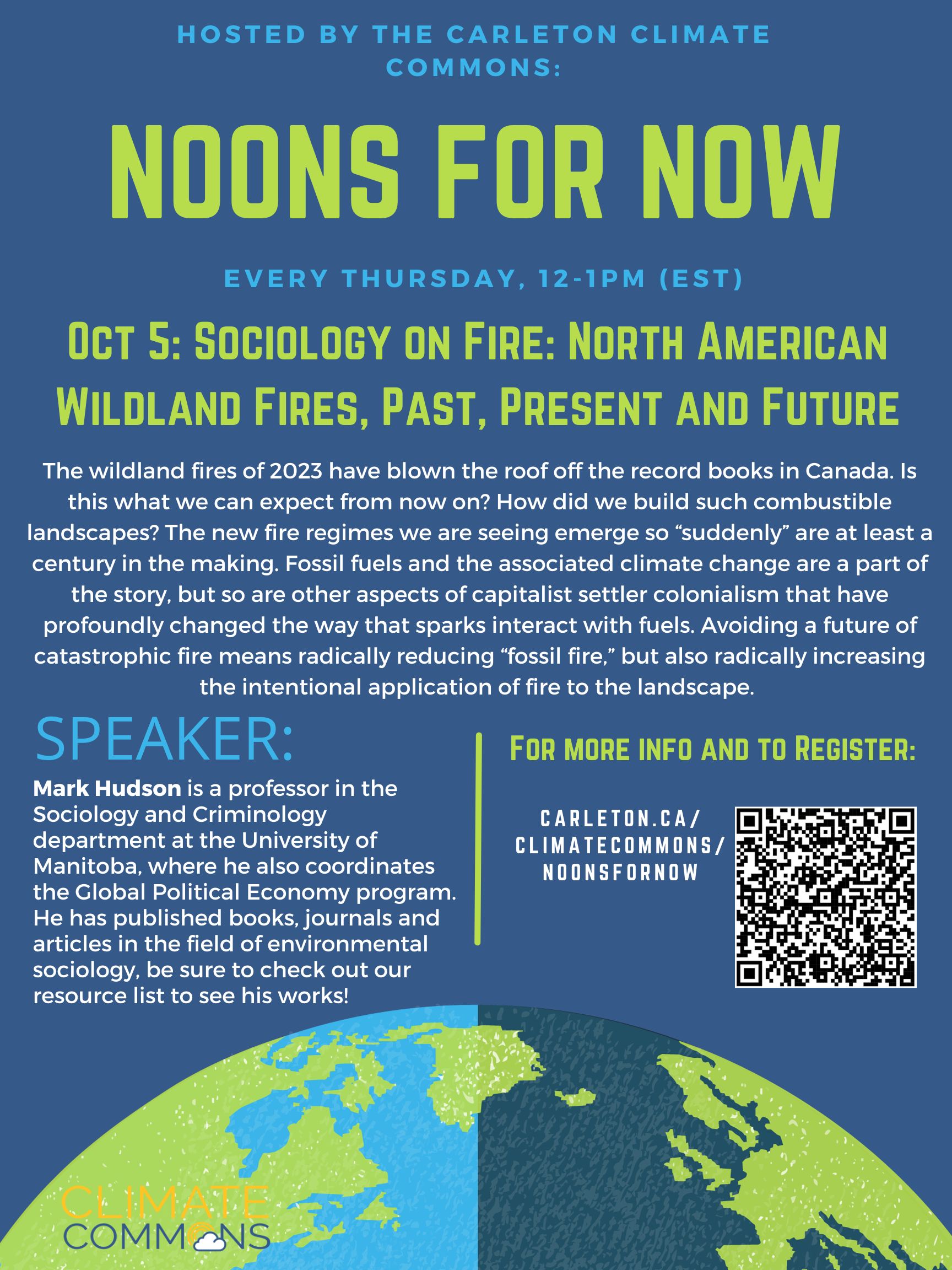
Mark Hudson is a professor in the Sociology and Criminology department at the University of Manitoba, where he also coordinates the Global Political Economy program. He has published books, journals and articles in the field of environmental sociology, be sure to check out our resource list to see his works!
The wildland fires of 2023 have blown the roof off the record books in Canada. Is this what we can expect from now on? How did we build such combustible landscapes? The new fire regimes we are seeing emerge so “suddenly” are at least a century in the making. Fossil fuels and the associated climate change are a part of the story, but so are other aspects of capitalist settler colonialism that have profoundly changed the way that sparks interact with fuels. Avoiding a future of catastrophic fire means radically reducing “fossil fire,” but also radically increasing the intentional application of fire to the landscape.
Actions
- Keep fighting on climate mitigation
- Activism and protests
- Depending on where you live, you may need to be more prepared for fire.
- Communities preparing wildfire mitigation and planning strategies
- Standardization, specifically to communities, on how to deal with fires in policy
- Be wary of misinformation and romanticization of fires
- Fire fighting and private property, need to be more willing to sacrifice buildings to save firefighter’s lives
- Support the Climate Disaster Project
- Go bags, and raising awareness on how to be prepared for fires
Resource List
The following is a list of resources recommended by attendees at our event.
Mark Hudson’s Work related to wildfires:
Hudson, Mark. Fire Management in the American West: Forest Politics and the Rise of Megafires. University Press of Colorado, 2011. JSTOR, https://www.jstor.org/stable/j.ctt46ntch.
“Mark Hudson: The Fires Will Come.” Berfrois, 13 May 2011, https://www.berfrois.com/2011/05/mark-hudson-fires-will-come/.
Journal Articles on Wildfires:
Davis, Mike. “The Case for Letting Malibu Burn.” Environmental History Review. https://doi.org/10.2307/3984830.
Hoffman, Kira M., et al. “The Right to Burn: Barriers and Opportunities for Indigenous-Led Fire Stewardship in Canada.” FACETS, vol. 7, Jan. 2022, pp. 464–81. facetsjournal.com (Atypon), https://doi.org/10.1139/facets-2021-0062.
Rose, D. Decolonising the Discourse of Environmental Knowledge in Settler Societies. 2001, can be found in: Culture and Waste: The Creation and Destruction of Value by Gay Hawkins and Stephen Muecke. https://pdfs.semanticscholar.org/bd95/d115f425d5328b88b7820973e68c34f2dadd.pdf
Other Books on Wildfires:
Struzik, Edward. Dark Days at Noon | McGill-Queen’s University Press. https://www.mqup.ca/dark-days-at-noon-products-9780228012092.php.
Info on Disaster Experience, Perceptions of Risk, and Behaviour:
“Risk Perceptions and Amplification Effects over Time: Evaluating Fukushima Longitudinal Surveys”. Hagen, Bjoern; Opejin, Adenike; Pijawka, K. David. Sustainability (Basel, Switzerland), 2022. https://www.mdpi.com/2071-1050/14/13/7896
“Whether a large disaster could change public concern and risk perception: a case study of the 7/21 extraordinary rainstorm disaster in Beijing in 2012” Su, Yun; Zhao, Fan; Tan, Lingzhao. Natural hazards (Dordrecht), 2015, Vol.78 (1), p.555-567, Article A029.
“How Wildfire Experience Influences Intentions to Adopt Protective Measures over Time” Heng Li. Journal of Loss and Trauma.
“Is Seeing Believing? Perceptions of Wildfire Risk Over Time” Champ, Patricia A., and Brenkert-Smith, H. Risk Analysis 36 (4): 816-830.